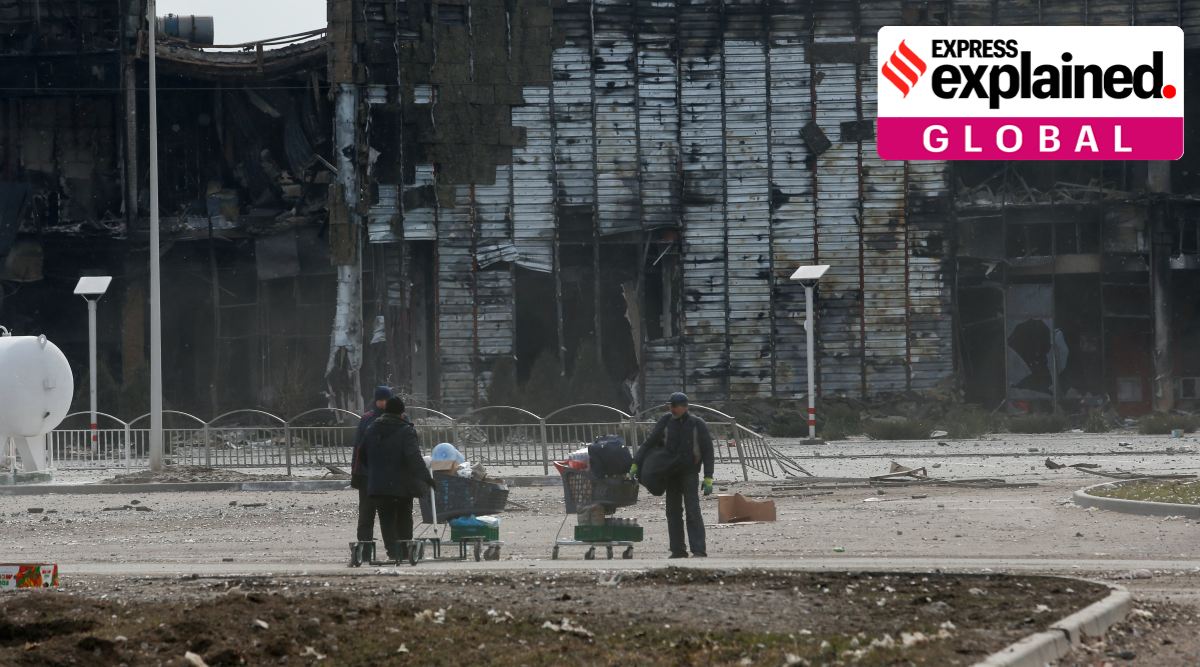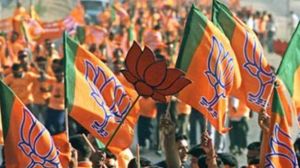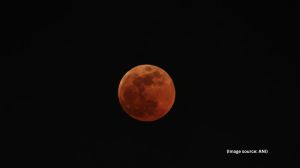Explained: What Russia’s war on Ukraine has meant for its news media
In Russia’s highly censored media landscape, it is rare for journalists and media professionals to question the Kremlin’s official position. We look at what that has meant for war news coverage, and how voices of dissent are faring.
 People use carts to transport belongings near a building, which was destroyed during Ukraine-Russia conflict in the besieged southern port city of Mariupol, Ukraine March 17, 2022. (REUTERS Photo)
People use carts to transport belongings near a building, which was destroyed during Ukraine-Russia conflict in the besieged southern port city of Mariupol, Ukraine March 17, 2022. (REUTERS Photo)An unexpected yet extraordinary show of dissent against the war in Ukraine played out on television sets across Russia earlier this week when Marina Ovsyannikova, an editor at Russia’s Channel One, burst onto the set of a live broadcast and chanted: “Stop the war. No to war.”
To further drive home the point, she stood behind the news anchor holding a handmade poster that read: “Don’t believe the propaganda. They’re lying to you here.”
The Kremlin described her actions as “hooliganism” and she was quickly arrested. She was later released and fined about $270, but she could still potentially face a longer prison sentence. Appearing in court on Tuesday, she refused to retract her statement against the war.
While the channel promptly switched to a recorded segment within seconds of the incident, Ovsyannikova’s message was heard loud and clear across the globe.
In Russia’s highly censored media landscape, it is rare for journalists and media professionals to question the Kremlin’s official position. The Indian Express takes a look at Russia’s media policy and how the war in Ukraine has intensified the country’s crackdown on local and independent media outlets.
Putin’s censorship bill
A week after invading Ukraine, Russian President Vladimir Putin signed a controversial censorship bill into law. The new law banned the dissemination of “fake” news about the Ukraine invasion, with a penalty of up to 15 years in prison for anyone convicted, CNN reported. But the definition of what constitutes “fake” news remains elusive.
According to a report by The New York Times, the law could potentially make it illegal for a news outlet to refer to the attack in Ukraine as a “war”, with the Kremlin maintaining that it is a “special military operation”. Authorities have penalised journalists and news outlets that have violated the law since the war started.
Another law penalises any coverage of the Russian military that does not align with the government or is seen as denigrating the armed forces.
In the past few weeks alone, some of Russia’s oldest independent news outlets, including the radio station Ekho Moskvy and the TV channel Dozhd, have chosen to shut down. At least 150 journalists have been forced to flee the country since the war started, according to the Georgia-based investigative news website Agentstvo. Many journalists have also chosen to resign from some of Russia’s top state-controlled news organisations, BBC reported.
The latest print edition of @novaya_gazeta. “A release of Novaya, created in accordance with all the rules of Russia’s amended Criminal Code.” A mushroom cloud and a Swan Lake reference. Grim stuff. pic.twitter.com/vGY7ukACe5
— Kevin Rothrock (@KevinRothrock) March 9, 2022
Crackdown on foreign media
Russia’s latest censorship campaign was said to have first started on February 26, when the country’s internet connection was disrupted. Users began to complain that they were unable to access Facebook and Twitter.
Russia’s media regulator Roskomnadzor accused social media platforms like Facebook of “discrimination” against Russian media and state information resources. The agency claimed that Facebook’s latest restrictions imposed on the Russian news channel RT and other state-controlled media violated Russian law, AP reported.
Ten news outlets, including Russian-language BBC and Deutsche Welle, received a letter from Roskomnadzor, warning them that access to their websites would be “restricted” if they did not take down content that did not comply with the Kremlin’s rules, Euro News reported. The flagged content included coverage of anti-war protests in Russia and op-eds by critics of Putin.
Earlier this month, leading Latvia-based investigative outlet Meduza, and Radio Free Europe’s Russian branch, Radio Svoboda, were outlawed by Roskomnadzor.
In response to Russia’s recent crackdown on the media, nearly all international networks, including CNN, and ABC News, have temporarily suspended broadcasting in the country. Bloomberg and the BBC, too, have said that they are halting the work of their journalists and support staff in Russia.
Many of Russia’s independent journalists are now using Telegram to disseminate information, according to a report by NPR.
How is the state-owned media covering the war in Ukraine?
With independent news outlets choosing to shutter en masse rather than buckle to the Kremlin, state-backed media are increasingly becoming the only source of news in Russia. Russian media has drastically underplayed the scale of the attack on Ukraine, using phrases like “military operation” instead of “war” or “invasion”.
Russian news stories have also been distorting the situation in Ukraine, according to a report by Time Magazine. For instance, contrary to reports by international media, an article in RIA News repeated a claim made by the Russian Defence Ministry, which rubbished all reports of Russian aircraft and armoured vehicles being damaged during the war. The article further alleged that Ukrainian military personnel were abandoning their posts without offering any resistance.
The Russian media has also on multiple occasions downplayed the threat posed to Ukrainian civilians. “As the Russian Federation’s Ministry of Defense stated, the Russian military isn’t striking cities, but only incapacitates military infrastructure, so nothing is threatening the civilian population,” an article released by TASS news agency on the evacuation of Ukrainians reads. According to UN figures, at least 636 civilians have been killed in the war so far.
But cracks are starting to appear in Russia’s propaganda machinery. During an episode of a popular television talk show hosted by pro-Putin journalist Vladimir Solovyov, his guests began to openly criticise the Russian government.
In another such instance, a Russian army officer admitted on the Ministry of Defense’s television channel, Zvezda, that Russian soldiers were dying in Ukraine. “Our guys over there, from Donetsk and Luhansk, and our special operation forces are dying,” he said.
What was Russia’s media policy before the war?
While censorship is prohibited under the Russian constitution, the Kremlin has found ways to work around it over the years. The tool most commonly used to target and penalise journalists has been the ‘foreign agent’ law.
The law, which was passed in 2017, makes it mandatory for all outlets classified as ‘foreign agents’ to include a disclaimer before their content that states that the material was distributed by a foreign media outlet or a Russian legal entity “performing the functions of a foreign agent”. The all-caps text must be added to all posts, including articles, videos and even Instagram stories.
Being labelled as a foreign agent tends to greatly diminish advertising revenue for many of these news outlets.
The all-powerful Roskomnadzor has also helped further the Kremlin’s agenda by exercising pressure on the country’s news media. Over the decades, journalists who have been critical of Putin and the Kremlin have been targeted with raids and criminal cases.
Putin’s attempts to bring the Russian media to heel first began in 2000, soon after he became president. He quickly took control of NTV, Russia’s only independent television network. In the decade that followed, several prestige newspapers were bought by state-owned companies and pro-Kremlin businessmen.
The decade also witnessed several high-profile attacks on journalists — most notably the assassination of five reporters who worked for the Russian newspaper Novaya Gazeta.
Just last year, the European court of human rights ruled that Russia had not adequately investigated the abduction and assassination of one of the reporters, Natalya Estemirova, in Chechnya in 2009, The Guardian reported.
The fatal shooting of another, Anna Politkovskaya, in October 2006 was also widely and controversially linked to the Kremlin. Politkovskaya was best known for her investigative reportage of corruption and crimes carried out during the Second Chechen War.
Newsletter | Click to get the day’s best explainers in your inbox
- 01
- 02
- 03
- 04
- 05







































